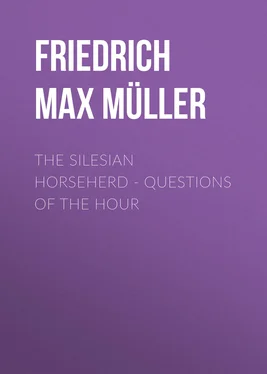Friedrich Max Müller - The Silesian Horseherd. Questions of the Hour
Здесь есть возможность читать онлайн «Friedrich Max Müller - The Silesian Horseherd. Questions of the Hour» — ознакомительный отрывок электронной книги совершенно бесплатно, а после прочтения отрывка купить полную версию. В некоторых случаях можно слушать аудио, скачать через торрент в формате fb2 и присутствует краткое содержание. Жанр: foreign_prose, foreign_religion, Философия, foreign_psychology, foreign_antique, на английском языке. Описание произведения, (предисловие) а так же отзывы посетителей доступны на портале библиотеки ЛибКат.
- Название:The Silesian Horseherd. Questions of the Hour
- Автор:
- Жанр:
- Год:неизвестен
- ISBN:нет данных
- Рейтинг книги:4 / 5. Голосов: 1
-
Избранное:Добавить в избранное
- Отзывы:
-
Ваша оценка:
- 80
- 1
- 2
- 3
- 4
- 5
The Silesian Horseherd. Questions of the Hour: краткое содержание, описание и аннотация
Предлагаем к чтению аннотацию, описание, краткое содержание или предисловие (зависит от того, что написал сам автор книги «The Silesian Horseherd. Questions of the Hour»). Если вы не нашли необходимую информацию о книге — напишите в комментариях, мы постараемся отыскать её.
The Silesian Horseherd. Questions of the Hour — читать онлайн ознакомительный отрывок
Ниже представлен текст книги, разбитый по страницам. Система сохранения места последней прочитанной страницы, позволяет с удобством читать онлайн бесплатно книгу «The Silesian Horseherd. Questions of the Hour», без необходимости каждый раз заново искать на чём Вы остановились. Поставьте закладку, и сможете в любой момент перейти на страницу, на которой закончили чтение.
Интервал:
Закладка:
The entire Logos, or the sum of Ideas, is called by Philo, entirely independent of Christianity, the true Son of God, while the realised world of Christian teaching passes as the second Son. If the first Logos is occasionally called the image or shadow of God, the world of sense is the image of the image, the shadow of the shadow. More logically expressed, God would be the causa efficiens , matter the causa materialis , the Logos the causa instrumentalis , while the goodness of God is sometimes added as the causa finalis . At the same time we also see here the difference between the working of the Jewish and Greek minds. In the Old Testament and in Philo, the Sophia or wisdom of God becomes a half mythological being, a goddess who is called the mother, and even the nurse, 17 17 τιθήνη.
of all beings. She bore with much labour out of the seed of God, 18 18 De Ebriet. , VIII, 1, 361 f.
as Philo says, the only and beloved visible Son, that is to say, this Cosmos. This Cosmos is called by him the Son of God, 19 19 υἱὸς τοῦ θεοῦ.
the only begotten, 20 20 μονογενής.
while the first Logos is the first-born, 21 21 πρωτόγονος.
and as such often coincides with the Sophia and its activity. 22 22 σοφία = θεοῦ λόγος.
He is also called the elder son, 23 23 πρεσβύτερος υἱὸς.
and as such is distinguished from a younger son, 24 24 νεώτερος υἱὸς τοῦ θεοῦ.
from the real, visible world. But this divine Sophia may not, according to Philo, any more than God Himself, come into direct contact with impure matter. According to him this contact occurs through the instrumentality of certain powers, 25 25 δυνάμεις.
which in part correspond to the Greek Logoi, and which in his poetic language are also represented as angels. 26 26 M. M., Theosophy and Psychological Religion , p. 406.
Philo says in plain terms that the eternal Logoi, that is the Platonic ideas, are commonly called angels.
We see by this in how misty an atmosphere Philo lived and wrote, and we may be certain that he was not the only one who in this manner blended the Jewish religion with Greek philosophy. In the Samaritan theology also, in Onkelos and Jonathan, traces of the Logos idea are to be found. 27 27 Lücke, Commentary on the Gospel of John .
If we now observe in the Fourth Gospel, somewhere in the first half of the second century, this same amalgamation of Christian doctrine with Platonic philosophy, only in a much clearer manner, we can scarcely doubt from what source the ideas of the Logos as the only begotten Son of God, and of the divine wisdom, originally flowed. Christian theologians are more inclined to find the first germs of these Christian dogmas in the Old Testament, and it is not to be denied that in the minds of the authors of some of the books of the Old Testament analogous ideas struggle for expression. But they are always tinctured with mythology, and among the prophets and philosophers of the Old Testament there is absolutely no trace of a truly philosophical conception of the Logos, such as confronts us as a result of centuries of thought among the Platonists and Neo-Platonists, the Stoics and Neo-Stoics. We look in vain in Palestine for a word like Logos, for a conception of the Cosmos as the expression of a rationally thinking mind, especially for the Logoi as the species of the Logos, as the primeval thoughts and types of the universe. It is difficult to understand why theologians should have so strenuously endeavoured to seek the germs of the Logos doctrine among the Jews rather than the Greeks, as if it was of any moment on which soil the truth had grown, and as if for purely speculative truths, the Greek soil had not been ploughed far deeper and cultivated more thoroughly than the Jewish. That Philo found employment for Platonic ideas, and especially for the Stoic Logos, nay, even for the Logoi, in his own house, and that other philosophers went so far as to declare the fundamental truths of Greek philosophy to have been borrowed from the Old Testament, is well known; but modern researches have rendered such ideas impossible. The correspondences to the Greek Logos that are found in the Old Testament are of great interest, in so far as they make the later amalgamation of Semitic and Aryan ideas historically more intelligible, and also in so far as—like the correspondences to be found among the East Indians and even the red Indians 28 28 M. M., Theosophy and Psychological Religion , p. 383.
—they confirm the truth or at least the innate human character of a Logos doctrine. But wherever we encounter the word Logos outside of Greece, it is, and remains, a foreign word, a Hellenic thought.
Jewish philosophers, while they adopted the word, only filled their old skins with new wine, with the natural consequence that the wine burst the old skins; but without spilling. For it was this which, in the hands of such men as the writer of the Fourth Gospel, as Hippolytus, Clement, Origen, and the best of the church fathers, gave them the strength and enthusiasm to triumph over the world, and especially over the strongholds of heathen religion, and even over Greek philosophy. Had the Fourth Evangelist wished to say that Christ was the divine Sophia or the Shekinah, or, as in Job, Wisdom as the fear of God, would he have said, “In the beginning was the Logos, and the Logos became flesh, and lived among us, and we saw his glory, a glory as of the only begotten Son of the Father, full of grace and truth?” Why not take the facts just as they are, and why wish to improve that which requires no human improvement? The Christian doctrine is and remains what it is; it rests on an indestructible arch, supported on one side by the Old Testament and on the other by Greek philosophy, each as indispensable as the other. We forget only too readily how much Christianity, in its victory over Greek philosophy, owes to this very philosophy. Christianity could no doubt have achieved the moral and social regeneration of the people without these weapons of the Greek mind; but a religion, especially in the age of the downfall of Greek and Roman philosophy, must have been armed for battle with the best, the most cultured, and the most learned classes of society, and such a battle demanded a knowledge of the weapons which had been forged in the schools of Greek philosophy. We cannot therefore put too high a value on the Fourth Gospel for a knowledge of the intellectual movement of that day. It is true that a religion need not be a philosophy, but it must not owe philosophy any answer. Small as may be the emphasis that we now lay on the Logos doctrine, in that period it was the centre, the vital germ of the whole Christian teaching. If we read any of the writings of Athanasius, or of any of the older church fathers, we shall be surprised to see how all of them begin with the Word (Logos) as a fixed point of departure, and then proceed to prove that the Word is the Son of God, and finally that the Son of God is Jesus of Nazareth. Religious and philosophical are here closely related. If the Christian philosophers gain on the one hand the divinity of the Son of God, on the other hand they retain the rationality of the created universe. That “the ALL is Logos, is Word or Reason,” was at that time as much the battle cry of the prevailing philosophy as the contrary has now become the battle cry of the Darwinians, who seek to explain species, kinds, i.e. the Logoi, the divine ideas, as the products not of the originating Mind, but of natural selection, of environment or circumstance, of the survival of the fittest. And what is the fittest, if not the rational, the Platonic “Good,” that is, the Logos? Why, then, turn back to the stone age of human thinking, why again turn nature into wood, when for thousands of years Greek philosophers and Christian thinkers have recognised her as something spiritual, as a world of eternal ideas? How would such men as Herder, Schelling, and Hegel have smiled at such a view of the world! Yes, Darwin himself would be ashamed of his followers, for he saw, though not always clearly, that everything in this sphere presupposes something beyond, and in the loftiest utterance of his book he demanded an origin, yes, an originator. In the writings of the philosophical church fathers we constantly hear more of the Logos which was in the beginning, and through which all things were made, than of God, who in the beginning created heaven and earth.
Читать дальшеИнтервал:
Закладка:
Похожие книги на «The Silesian Horseherd. Questions of the Hour»
Представляем Вашему вниманию похожие книги на «The Silesian Horseherd. Questions of the Hour» списком для выбора. Мы отобрали схожую по названию и смыслу литературу в надежде предоставить читателям больше вариантов отыскать новые, интересные, ещё непрочитанные произведения.
Обсуждение, отзывы о книге «The Silesian Horseherd. Questions of the Hour» и просто собственные мнения читателей. Оставьте ваши комментарии, напишите, что Вы думаете о произведении, его смысле или главных героях. Укажите что конкретно понравилось, а что нет, и почему Вы так считаете.












